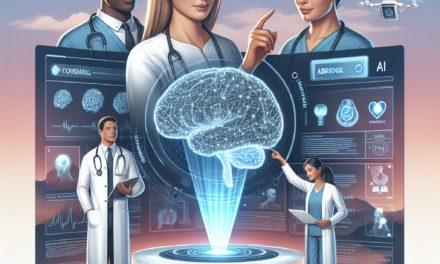Dr. Oz Appointed as Head of CMS: A New Era in Healthcare Leadership
The appointment of Dr. Mehmet Oz as the head of the Centers for Medicare & Medicaid Services (CMS) has sparked significant discussion and debate across the healthcare landscape. Known for his television presence and advocacy for health and wellness, Dr. Oz’s transition from media personality to a pivotal role in healthcare policy raises questions about the future direction of CMS and its impact on millions of Americans. This article delves into the implications of Dr. Oz’s appointment, exploring his background, the challenges facing CMS, potential reforms, and the broader implications for public health.
1. Background of Dr. Mehmet Oz
Dr. Mehmet Oz, a cardiothoracic surgeon and television personality, gained fame as the host of “The Dr. Oz Show,” where he discussed various health topics, often blending medical advice with lifestyle tips. His journey from the operating room to the television studio has been marked by both acclaim and controversy.
Born on June 11, 1960, in Cleveland, Ohio, Dr. Oz graduated from Harvard University and earned his medical degree from the University of Pennsylvania. He became a prominent figure in the medical community, serving as a professor at Columbia University and performing thousands of surgeries. His expertise in heart surgery and his charismatic communication style led to his rise as a trusted health advisor for many Americans.
However, Dr. Oz’s career has not been without criticism. His promotion of various health products and alternative medicine practices has drawn scrutiny from medical professionals and skeptics alike. Critics argue that some of his recommendations lack scientific backing, raising concerns about the potential for misinformation in public health messaging.
Despite the controversies, Dr. Oz’s popularity has remained strong, and his appointment as head of CMS signals a shift towards a more media-savvy approach to healthcare leadership. His ability to communicate complex medical concepts to the public may prove beneficial in addressing the challenges facing CMS.
2. The Role and Responsibilities of CMS
The Centers for Medicare & Medicaid Services (CMS) is a federal agency within the Department of Health and Human Services (HHS) responsible for administering the nation’s major healthcare programs, including Medicare, Medicaid, and the Children’s Health Insurance Program (CHIP). CMS plays a crucial role in shaping healthcare policy, regulating health insurance, and ensuring access to quality care for millions of Americans.
Key responsibilities of CMS include:
- Medicare Administration: CMS oversees the Medicare program, which provides health coverage for individuals aged 65 and older, as well as certain younger individuals with disabilities. This includes managing benefits, payments, and quality standards.
- Medicaid Management: CMS works with state governments to administer Medicaid, a program that provides health coverage for low-income individuals and families. This involves setting guidelines, funding, and ensuring compliance with federal regulations.
- Health Insurance Marketplace: CMS manages the Health Insurance Marketplace established under the Affordable Care Act (ACA), facilitating access to health insurance for those who do not qualify for Medicare or Medicaid.
- Quality Improvement: CMS is responsible for implementing quality improvement initiatives aimed at enhancing healthcare delivery and patient outcomes across various settings.
- Policy Development: The agency develops and enforces regulations that govern healthcare providers, insurers, and other stakeholders, influencing the overall direction of the healthcare system.
Given the complexity of these responsibilities, the head of CMS must navigate a landscape filled with political, economic, and social challenges. Dr. Oz’s appointment comes at a time when the agency faces significant scrutiny regarding its effectiveness and efficiency in delivering healthcare services.
3. Challenges Facing CMS Under Dr. Oz’s Leadership
Dr. Oz’s tenure as head of CMS will undoubtedly be marked by a series of challenges that require innovative solutions and strategic thinking. Some of the most pressing issues include:
- Healthcare Access: Millions of Americans still lack access to affordable healthcare. The COVID-19 pandemic exacerbated existing disparities, highlighting the need for comprehensive reforms to ensure equitable access to care.
- Rising Healthcare Costs: The United States spends more on healthcare than any other country, yet outcomes do not always reflect this investment. Addressing the rising costs of healthcare services and prescription drugs will be a critical challenge for Dr. Oz.
- Quality of Care: Ensuring high-quality care across diverse populations is essential. CMS must implement effective quality improvement initiatives that address variations in care delivery and patient outcomes.
- Technological Integration: The rapid advancement of healthcare technology presents both opportunities and challenges. Dr. Oz will need to navigate the integration of telehealth, electronic health records, and data analytics into the existing healthcare framework.
- Political Polarization: The healthcare landscape is highly politicized, with differing opinions on the role of government in healthcare. Dr. Oz will need to build bipartisan support for reforms while addressing the concerns of various stakeholders.
Addressing these challenges will require a collaborative approach, engaging healthcare providers, policymakers, and the public in meaningful dialogue. Dr. Oz’s experience in communication may serve him well in fostering these discussions.
4. Potential Reforms and Innovations
As head of CMS, Dr. Oz has the opportunity to implement reforms that could reshape the healthcare landscape. Some potential areas for innovation include:
- Value-Based Care: Transitioning from a fee-for-service model to value-based care can incentivize providers to focus on patient outcomes rather than the volume of services delivered. This approach could lead to improved quality of care and reduced costs.
- Telehealth Expansion: The COVID-19 pandemic accelerated the adoption of telehealth services. Dr. Oz could advocate for policies that expand access to telehealth, particularly for underserved populations, ensuring that virtual care becomes a permanent fixture in the healthcare system.
- Prescription Drug Pricing Reform: Addressing the high cost of prescription drugs is a priority for many Americans. Dr. Oz could explore strategies to negotiate drug prices, promote transparency in pricing, and encourage the use of generic medications.
- Health Equity Initiatives: To address disparities in healthcare access and outcomes, Dr. Oz could champion initiatives aimed at improving health equity. This could involve targeted outreach to marginalized communities and investments in social determinants of health.
- Data-Driven Decision Making: Leveraging data analytics can enhance decision-making processes within CMS. By utilizing data to identify trends, measure outcomes, and allocate resources effectively, Dr. Oz can drive improvements in healthcare delivery.
Implementing these reforms will require collaboration with various stakeholders, including healthcare providers, insurers, and patient advocacy groups. Dr. Oz’s ability to communicate and build consensus will be crucial in advancing these initiatives.
5. The Broader Implications for Public Health
Dr. Oz’s appointment as head of CMS has broader implications for public health beyond the immediate responsibilities of the agency. His influence may extend to shaping public perceptions of health and wellness, as well as the role of government in healthcare.
- Public Health Messaging: Dr. Oz’s background in media positions him uniquely to influence public health messaging. His ability to communicate effectively can help bridge the gap between complex medical information and public understanding, promoting healthier behaviors and informed decision-making.
- Trust in Healthcare Institutions: The appointment of a well-known figure like Dr. Oz may enhance public trust in CMS and government healthcare initiatives. By leveraging his platform, he can engage the public in discussions about health policy and encourage participation in programs like Medicare and Medicaid.
- Advocacy for Preventive Care: Dr. Oz has long advocated for preventive care and healthy lifestyles. His leadership at CMS could prioritize preventive measures, emphasizing the importance of early intervention and wellness programs to reduce the burden of chronic diseases.
- Integration of Holistic Approaches: Dr. Oz’s interest in holistic health may influence CMS to consider integrative approaches to healthcare, incorporating mental health, nutrition, and lifestyle factors into traditional medical care.
- Engagement with Emerging Health Trends: As new health trends emerge, Dr. Oz’s media experience may enable CMS to stay ahead of the curve, adapting policies to address evolving public health challenges and innovations.
The implications of Dr. Oz’s leadership extend beyond policy changes; they encompass a potential cultural shift in how healthcare is perceived and delivered in the United States.
Conclusion
Dr. Mehmet Oz’s appointment as head of the Centers for Medicare & Medicaid Services marks a significant moment in the evolution of healthcare leadership in the United States. His unique background as a surgeon and media personality positions him to address the complex challenges facing CMS while promoting innovative reforms that could reshape the healthcare landscape.
As he navigates the responsibilities of this role, Dr. Oz will need to confront pressing issues such as healthcare access, rising costs, and quality of care. By leveraging his communication skills and public presence, he has the potential to foster collaboration among stakeholders and engage the public in meaningful discussions about health policy.
The broader implications of his leadership extend to public health messaging, trust in healthcare institutions, and the integration of holistic approaches to care. As Dr. Oz embarks on this new chapter, the healthcare community and the public will be watching closely to see how his vision unfolds and what impact it will have on the future of healthcare in America.




